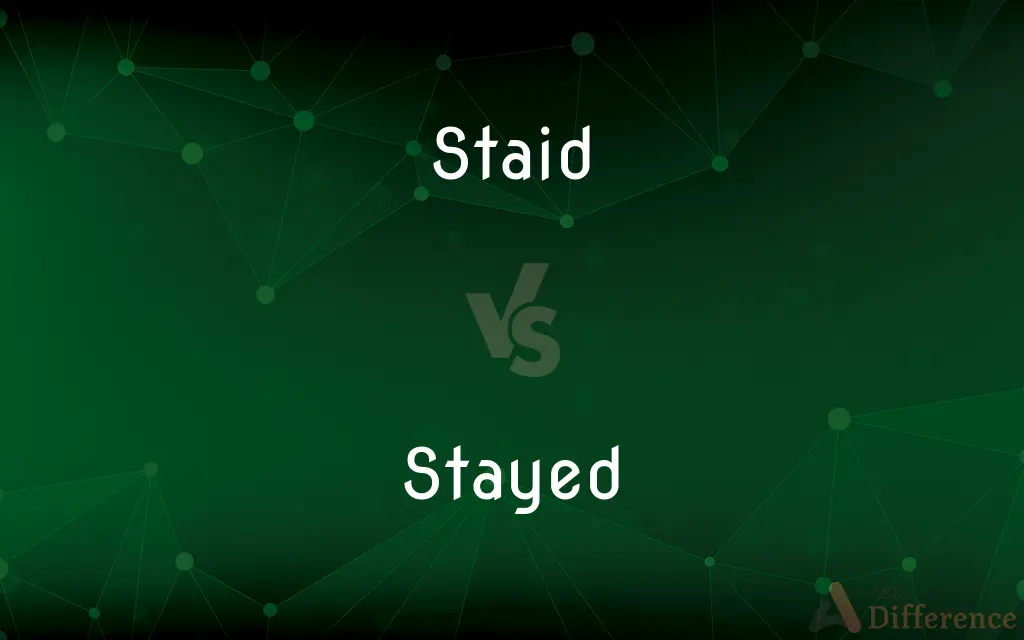Staid vs. Stayed — What's the Difference?
Edited by Tayyaba Rehman — By Urooj Arif — Updated on April 25, 2024
"Staid" describes a sedate, unadventurous quality, often associated with dignity and seriousness, while "stayed" is the past tense of "stay," indicating that someone or something remained in a place or condition.

Difference Between Staid and Stayed
Table of Contents
ADVERTISEMENT
Key Differences
"Staid" is an adjective used to characterize individuals, groups, or atmospheres as sober, traditional, or restrained in demeanor and style. In contrast, "stayed" serves as the past and past participle form of the verb "stay," which means to continue or remain in a specific state or location.
While "staid" often conveys a slightly negative or dull connotation, suggesting a lack of spontaneity and innovation, "stayed" is a neutral verb describing the action of remaining or persisting, without any inherent judgment on the character of the subject.
"Staid" can be used to describe a variety of subjects, from conservative dress or decor to a person's calm and deliberate behavior. On the other hand, "stayed" can apply to a broad spectrum of contexts, such as staying at a job, staying in a city, or maintaining a course of action.
The use of "staid" often implies a choice of lifestyle or demeanor, reflecting an individual's or group’s preference for order and tradition. Conversely, "stayed" simply describes the action taken or not taken, without implying deeper personality traits or preferences.
"Staid" is derived from the past participle of the now obsolete verb "staiden," which meant to be serious or grave, whereas "stayed" comes from the Old English "stæġ," related to staying or ceasing movement, emphasizing their different roots and usages.
ADVERTISEMENT
Comparison Chart
Part of Speech
Adjective
Verb (past and past participle)
Definition
Sober, grave, and unadventurous
Remained in the same place or condition
Connotation
Often negative or dull
Neutral
Usage Context
Describes demeanor, style, atmosphere
Describes actions or decisions
Etymology
From obsolete "staiden" (to be serious)
From Old English "stæġ" (remain, cease)
Compare with Definitions
Staid
Characterized by dignity and often a lack of humor.
The meeting was conducted in a staid manner, fitting the serious nature of the discussion.
Stayed
Delayed leaving or discontinuing.
She stayed in the office late to finish the report.
Staid
Marked by sedateness and often a conservative attitude.
He preferred staid colors like gray and navy for his office attire.
Stayed
Continued in the same state or condition.
He stayed calm despite the chaos around him.
Staid
Showing settled, quiet character.
Her staid demeanor made her a calming presence in the hectic office.
Stayed
Abided or adhered to a particular path.
They stayed the course despite numerous challenges.
Staid
Resistant to change or innovation.
The staid management was reluctant to adopt the new technologies.
Stayed
Remained in a particular place.
We stayed at a lovely hotel during our vacation.
Staid
Traditional or old-fashioned.
The club’s staid traditions were upheld by its longest-standing members.
Stayed
Resided temporarily.
During the conference, attendees stayed in various nearby hotels.
Staid
Characterized by sedateness and often a strait-laced sense of propriety; serious and conventional.
Stayed
To continue to be in a place or condition
Stay home.
Stay calm.
Staid
Fixed; permanent
"There is nothing settled, nothing staid in this universe" (Virginia Woolf).
Stayed
To remain or sojourn as a guest or lodger
Stayed at a motel.
Staid
Not capricious or impulsive; sedate, serious, sober.
Stayed
To linger or wait in order to do or experience something
We stayed to watch the final minutes of the game.
Staid
(rare) Always fixed in the same location; stationary.
Stayed
To continue or persist in an action or activity
Stayed with the original plan.
Stayed in college.
Staid
Obsolete spelling of stayed
Stayed
To keep up in a race or contest
Tried to stay with the lead runner.
Staid
Sober; grave; steady; sedate; composed; regular; not wild, volatile, flighty, or fanciful.
O'erlaid with black, staid Wisdom's hue.
Stayed
(Games) To meet a bet in poker without raising it.
Staid
Characterized by dignity and propriety
Stayed
(Archaic) To stop moving or stop doing something.
Stayed
To remain during
Stayed the week with my parents.
Stayed the duration of the game.
Stayed
To stop or restrain; check
Doubt stayed his hand.
Stayed
To suspend by legal order the implementation of (a planned action), especially pending further proceedings
Stay a prisoner's execution.
Stayed
To satisfy or appease temporarily
Stayed his anger.
Stayed
(Archaic) To wait for; await
"I will not stay thy questions. Let me go.
/ Or if thou follow me, do not believe / But I shall do thee mischief in the wood" (Shakespeare).
Stayed
To brace, support, or prop up
The tower is stayed with cables.
Stayed
To put (a ship) on the opposite tack or to come about.
Stayed
A brief period of residence or visiting.
Stayed
The order by which a planned action is stayed.
Stayed
The consequence of such an order.
Stayed
The act of halting; check.
Stayed
The act of coming to a halt.
Stayed
A support or brace.
Stayed
A strip of bone, plastic, or metal, used to stiffen a garment or part, such as a corset or shirt collar.
Stayed
Stays A corset.
Stayed
(Nautical) A heavy rope or cable, usually of wire, used as a brace or support for a mast or spar.
Stayed
A rope used to steady, guide, or brace.
Stayed
Simple past tense and past participle of stay
Stayed
Staid; fixed; settled; sober; - now written staid. See Staid.
Common Curiosities
Can "stayed" have different meanings based on context?
Yes, "stayed" can mean remaining in a place, continuing in a condition, or adhering to a decision.
What is the difference between "stayed" as a verb and "staid" as an adjective?
"Stayed" refers to the action of remaining, while "staid" describes a quality of sobriety and seriousness.
Is "staid" a compliment or a criticism?
It can be both, depending on context, but often carries a slightly negative connotation of being overly serious or dull.
What does it mean if a person is described as staid?
It means they are typically sober, grave, and perhaps conservative in their demeanor and lifestyle.
What is an example of how "stayed" can be used in a sentence?
"She stayed at the party until midnight."
Can "staid" be used to describe a group or setting, not just individuals?
Yes, "staid" can describe groups, settings, and even atmospheres that are characterized by tradition and seriousness.
Can someone be both "staid" and lively in different contexts?
Yes, someone might display a staid demeanor in professional settings while being more lively in personal situations.
How can one use "stayed" to describe emotional states?
E.g., "He stayed excited throughout the entire game."
Is "staid" commonly used in modern English?
It's less common but still used, especially in formal or literary contexts.
How does the historical usage of "staid" influence its modern perception?
Its origins in seriousness and gravity influence its modern use as indicative of traditional, conservative, or sober attributes.
Share Your Discovery

Previous Comparison
Insinuation vs. Imply
Next Comparison
Foregoing vs. ForgoingAuthor Spotlight
Written by
Urooj ArifUrooj is a skilled content writer at Ask Difference, known for her exceptional ability to simplify complex topics into engaging and informative content. With a passion for research and a flair for clear, concise writing, she consistently delivers articles that resonate with our diverse audience.
Edited by
Tayyaba RehmanTayyaba Rehman is a distinguished writer, currently serving as a primary contributor to askdifference.com. As a researcher in semantics and etymology, Tayyaba's passion for the complexity of languages and their distinctions has found a perfect home on the platform. Tayyaba delves into the intricacies of language, distinguishing between commonly confused words and phrases, thereby providing clarity for readers worldwide.














































